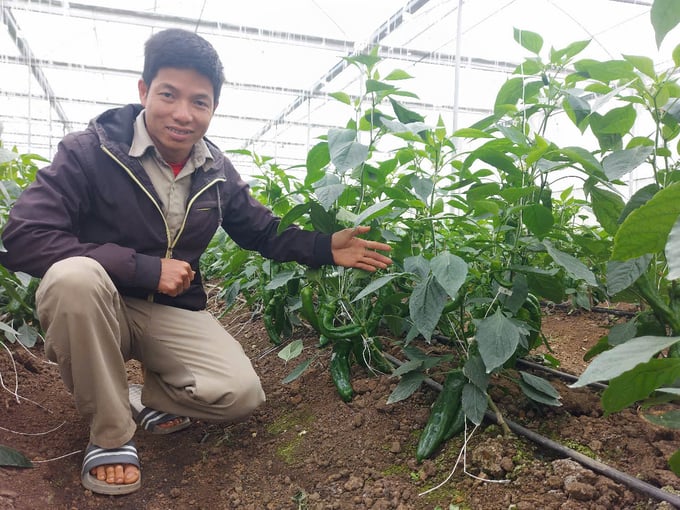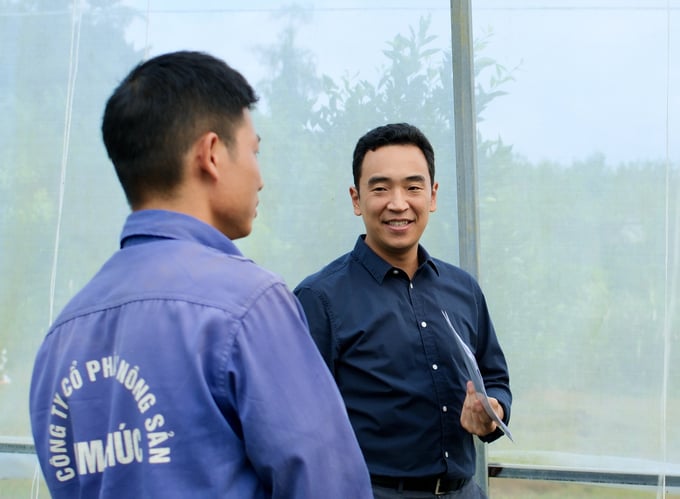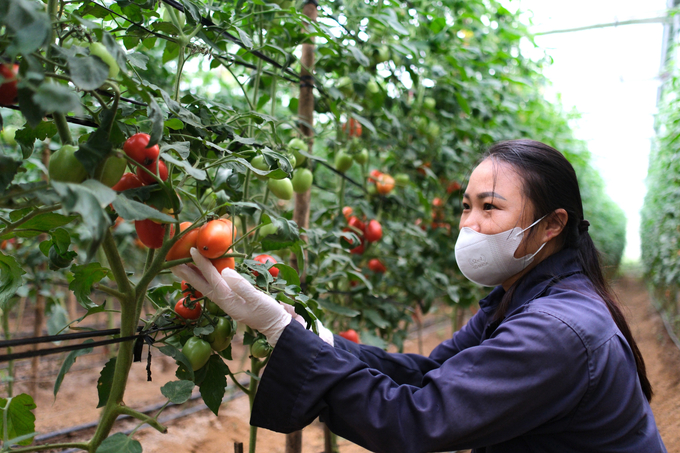November 27, 2025 | 22:24 GMT +7
November 27, 2025 | 22:24 GMT +7
Hotline: 0913.378.918
November 27, 2025 | 22:24 GMT +7
Hotline: 0913.378.918

The Director of the Tan Lap High-Tech Cooperative, Mr. Vu Van Hieu, is a leading farmer from Moc Chau District, Son La Province. Photo: Courtesy of the individual.
The Tan Lap High-Tech Cooperative (Tan Lap Commune, Moc Chau District, Son La Province) is located deep in the valley. The cooperative includes 8 households engaged in cultivating sweet peppers, oranges, and plums. Among them, the greenhouse area covers approximately 6.000 square meters.
Mr. Vu Van Hieu (35 years old), the Director of the cooperative, is hopeful that he can transform Tan Lap Commune into a smart agricultural production area. Together with 33 other households involved in the "Smart agriculture for future generations" project, he aims to turn Moc Chau into a concentrated area for growing fruits and vegetables. The project is funded by the South Korean government through the Food and Agriculture Organization (FAO) and has been approved by the People's Committee of Son La Province for implementation by the Institute of Vegetable and Fruit Research (Ministry of Agriculture and Rural Development) in the region.
High-tech greenhouses are proving to be a highly efficient agricultural solution, yielding significantly higher profits from the same area of cultivation. However, the large initial investment required has led the Tan Lap High-Tech Cooperative to take a gradual approach, expanding step by step.
At the end of 2022, when Mr. Vu Van Hieu was planning to build a greenhouse and he began researching successful bell pepper cultivation models in nearby areas. “I traveled all across Moc Chau, and everywhere I went, I saw greenhouses from the Project”, said the young director, who was deeply impressed by the modern design, insect-proof nets and superior sun-shading nets, which were a stark contrast to the makeshift greenhouses typically used by local farmers.
Although his cooperative was not initially part of the first round of investments under the Project, fortune smiled on Mr. Hieu when he was selected as one of the households to participate in the second phase. Thanks to this opportunity, the Tan Lap High-Tech Cooperative was able to build 1.836 square meters of greenhouse space, expanding from the 2.000 square meters of existing greenhouses.

Mr. Kim Hyunwoo, the Agricultural Attache of the Korean Embassy in Vietnam (right), is excited about the benefits that the Project has brought to the Tan Lap High-Tech Cooperative. Photo: Quynh Chi.
In the first year, the Tan Lap High-Tech Cooperative received support in the form of bell pepper seeds that were cultivated using an improved grafting technique. This method offers several advantages, including better disease resistance, higher fruit yield, and uniformity in both the shape and quality of the peppers. Mr. Vu Van Hieu, the cooperative’s director, took an active role in participating in the training sessions organized as part of the project. Through these sessions, he gained valuable knowledge, such as the safe use of plant protection products (pesticides), applying Trichoderma for root treatment and other advanced farming techniques. He then shared this knowledge with other cooperative members.
The cooperative's first greenhouse area, along with the support for market linkages and agricultural product consumption, allowed its members to make significant improvements in their economic situation. To meet the growing demand for a consistent and reliable supply of produce, the cooperative now plans to expand the greenhouse area further. This expansion is aimed at ensuring a continuous and abundant supply of high-quality products to the market, particularly to the lowland regions.
The first bell pepper harvest yielded 18 tons, with an average price of 1.20 USD/kg, generating a profit of around 20.000 USD. Building on this success, Mr. Vu Van Hieu continued to expand by constructing an additional 2.000 square meters of greenhouse space for growing tomatoes, applying smart agricultural techniques.
According to project officials, Mr. Hieu is considered a key figure in Tan Lap Commune, and he is expected to develop his greenhouse and high-tech farming model into a demonstration project, which will help improve the income of surrounding households. However, to turn this vision into reality, collaboration is needed from local authorities, scientists and businesses.
According to the technical staff of the "Smart agriculture for future generations" project, the establishment of a concentrated area for high-tech vegetable production is a macro-level management issue, which falls under the responsibility of the local government of Son La Province.
Currently, the province’s agricultural land is mainly allocated for tea cultivation, pastureland for livestock feed, mulberry trees, and various fruit crops such as plums, longan and custard apples. Land available for vegetable production is very limited and there is no specific plan for areas dedicated to high-tech agricultural production. However, with favorable conditions in terms of climate, soil and geographical location, the area of greenhouses and high-tech farming systems in Moc Chau is expected to steadily grow over the next 5 to 10 years.

FAO has proposed that Son La Province implement credit support policies for local farmers to invest in greenhouses and high-tech farming systems for growing vegetables and fruits. Photo: Quynh Chi.
Therefore, it is essential to have a well-planned strategy to avoid unnecessary issues like those in Da Lat today (such as landscape disruption and environmental pollution). Along with proper planning, infrastructure systems (roads, electricity, water, storage, collection and processing facilities) need to be upgraded to support farmers in developing concentrated high-tech vegetable production areas.
The FAO has recommended that Son La Province introduce credit support policies to assist farmers, as setting up greenhouses and other high-tech farming systems requires substantial capital investment. Since most farmers are still operating on a small scale and do not have sufficient financial resources to expand, the implementation of such credit support would be crucial. Once greenhouses and other high-tech systems are established, it is necessary to provide extensive training and technical support for farmers and cooperatives. This training should focus on key skills such as the management and operation of greenhouses, as well as applying advanced agricultural techniques for plant care within these systems.
Additionally, to ensure the sustainable growth of high-tech vegetable production in Moc Chau, it is important to foster strong collaboration between local authorities, researchers, producers and businesses. This collaboration would facilitate the transfer of knowledge and technology, while also creating robust market linkages to connect producers with buyers.
Translated by Phuong Linh

(VAN) On November 27, in the meeting with Minister Tran Duc Thang, Mayor Yin Yong shared Beijing’s experience to improve environment and air quality.

(VAN) After 30 years, both sides identified strategic areas of cooperation: sustainable production, increasing coffee value and training for farmers.
/2025/11/27/4910-4-164708_294.jpg)
(VAN) On the afternoon of November 27 in Beijing, Minister of Agriculture and Environment Tran Duc Thang held a working session with several major Chinese enterprises operating in the agriculture and environment sector.

(VAN) The Department of Animal Health issued a provisional guideline requesting local authorities to increase surveillance, collect samples for testing, and conduct epidemiological investigations according to the established procedure.

(VAN) The United Nations recommends that Vietnam utilize data and artificial intelligence to enhance early disaster warnings and reduce GDP losses by 3.2% in the context of climate change.

(VAN) On the morning of November 27 in Beijing, Minister Tran Duc Thang and the Deputy Commissioner General of the General Administration of Customs of China signed a protocol on fresh jackfruit exports.

(VAN) As floodwaters recede, a vast network of irrigation works across eastern Gia Lai is emerging in a state of severe disrepair, with extensive damage demanding urgent restoration ahead of the 2025-2026 winter-spring cropping season.